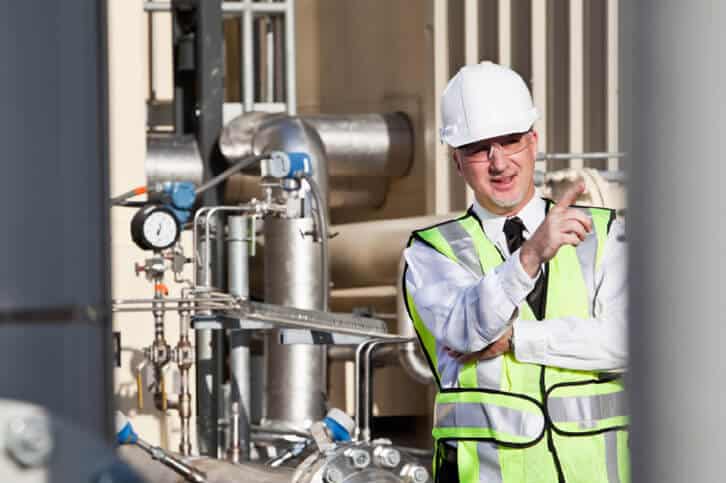What is a Process Engineer?
Process Engineers design, implement and optimise chemical and biochemical processes, especially continuous flow ones on an industrial scale to turn raw materials such as oil, natural gas or milk (using heat, pressure or a chemical agent) into an end product (e.g. drugs, milk formula, gasoline, beer, butter, bulk chemicals, etc.). Process engineers are typically trained in chemical engineering.
In summary, think of it as making products that have to be mixed or cooked from a formula or recipe but on a huge scale.
According to the BLS, the median annual wage for chemical/process engineers was $106,260 in May 2022 with projected job growth of 9% from 2020 to 2030.
Median level salaries after 5 years of experience range from €70,000 – €80,000 plus overtime, bonuses and allowances. (Irish Salary Calculator)
BTW, if you are interested in a career in the Pharmaceutical or Medtech industries or are considering upskilling for a better job or a promotion, check out our range of pharmaceutical courses.
Process Engineer Vs. Production or Manufacturing Engineer
Process engineers work in the manufacturing industry with the result that their roles are mixed up, confused or conflated with that of a production or manufacturing engineer, i.e. most employment websites, some company job descriptions, (currently) ChatGPT, etc.
Let’s take a look a the difference from the perspective of an engineer standing on the factory floor.
Process Engineers work in Process or Continuous Flow Manufacturing – takes a formulation or recipe of ingredients and using processes such as a chemical or biochemical reaction, heat, cold, mixing, fluidization, crushing, pulverization, screening, sieving, centrifugation, fermentation, distillation, separation, crystallization, evaporation, gas absorption, filtration, diafiltration, polymerization, isomerization, homogenization, pasteurization etc continuously or in a batch to make a final product which is usually a liquid, powder, gas or solid. (Think turning milk into baby formula, oil refining, gasoline, plastic, shampoo, washing powder, toothpaste, casein, cheese, butter, beer, wine, whiskey, paint, drug or vaccine manufacturing, etc)
In a process manufacturing factory, you typically find pipes, tanks, pumps, flow valves, steam valves, temperature gauges, boilers, vessels, reactor vessels, crackers, distillation columns, heat exchangers, boilers, steam pipes, autoclaves, clarifiers, decanters, fluidised dryers, Program Logic Controllers (PLCs) PID (Proportional Integral Derivative) Controllers, etc,
Production and Manufacturing Engineers work in Discrete Manufacturing. This involves (non-chemical or non-biochemical) processes such as machining, assembling, bolting, screwing, welding, riveting, glueing, forging, extruding, moulding, stamping and machine pressing, things that can be counted and itemised into a distinct product often on an assembly line. (Think car assembly – Toyota or Ford’s production line for electric cars, engines, cell phones, computers, washing machines, ball bearings, screws, wire, copper pipes, TVs, airplanes, syringes, medical pumps, scalpels or pacemakers, etc)
In a discrete manufacturing factory, you typically find, assembly lines, conveyor belts, U-shaped assembly areas, welding stations, machine tools, CNC machine centers, CNC lathes, stamping presses and dies, robots, pick and place (SCARA) robots, injection moulding machines, packing machines, air-powered assembly tools, painting and finishing areas, etc.
In summary, if what you are making needs chemistry like making washing powder, it’s process or chemical engineering, if it involves, cutting metal and welding or bolting something together like a washing machine, it’s manufacturing engineering.
Where Does a Process Engineer Work?
Process engineers spend most of their time in an office or based onsite at industrial plants and other large-scale manufacturing locations. Depending on the role, they are often required to monitor or direct operations or be involved in the design or upgrading of existing facilities. They typically work in the following sectors.
- Food and dairy
- Beer and whiskey manufacturing
- Chemical manufacturing
- Petrochemical manufacturing
- Agriculture processing
- Mineral processing
- Cosmetics
- Pharmaceutical and biopharmaceutical manufacturing
- Engineering consultancies focused on the above sectors
- Engineering contractors focused on the above sectors
Watch this Video on a Process Engineer’s Role!
To hear more about the work of a Process Engineer from someone in the role, check out this video from the About Bioscience website, produced by the North Carolina Association for Biomedical Research.
What Does a Process Engineer Do?
A Process Engineer’s job can be extremely varied.
In larger companies, Process Engineers may specialize in a niche area but in smaller facilities, they can be responsible for a huge variety of tasks.
These tasks can include:
- Design and development of a continuous manufacturing process along with the layout and equipment for a new factory. This includes creating and setting specifications, developing, implementing and monitoring this equipment as part of the manufacturing system.
- Commissioning and qualification of that new factory
- Modify and optimize equipment and processes that are already in place
- Use of simulation software in the development of new processes
- Completion of documentation to show and ensure compliance with both internal and external regulations and protocols
- Oversight of processes and working to maintain optimization of the continuous manufacturing process
- Monitoring of equipment – including regular testing and ensuring maintenance tasks are carried out
- Assisting Process Technicians in troubleshooting in the event of a problem
- Data collection, interpretation and report writing
- Planning and installation of new equipment
- Risk assessments of the equipment and processes being used. Of course, this refers to staff safety and safety within the plant, but this can also extend outwards to include things such as the environmental impact
- Continual evaluation of equipment and processes to ensure both efficiency and quality remain high
- Budget responsibilities
Process Engineer Vs. Chemical Engineer
For some people, process engineers and chemical engineers are synonymous.
For others, a process engineer is a job title for someone who works in a factory to manage, analyse, optimise chemical and biochemical manufacturing processes, and conduct and manage any maintenance projects. In contrast, chemical engineering is used as a university degree title. However, a chemical engineer can also be used as a job title in the bulk chemical manufacturing or petrochemical manufacturing industry or in roles where there is a huge emphasis on process design.
But as always, there are exceptions.
What Skills Do I Need?
The ideal skill set for someone moving into process engineering includes:
- Interpret technical drawings – especially process flow diagrams, piping and instrumentation diagrams (P&IDs) and pipe skids
- Project management – have to ability to manage people, budgets and complex projects and bring them to completion on time and on budget
- Spatial reasoning – the ability to see a two or three-dimensional object and then mentally manipulate it
- Critical/logical thinking – have to locate problems, and then think of those problems from a variety of perspectives to assess the best solution
- Excellent communication skills – working with people across the manufacturing process, they have to be able to manage people well and communicate new ideas effectively
- Calm under pressure – must be able to troubleshoot at an advanced level. If a problem is delaying manufacturing, they must be able to come up with effective working solutions quickly
- Commercial awareness – usually working within strict time and budgetary constraints
- Excellent computer skills – IT is an essential part of this role, uses include simulation software, design software and reporting
- Analytical skills – responsible for analysis and interpretation of data into charts, diagrams, and reports
- Negotiation skills – vital if charged with budgetary or schedule management
- Creative thinking and excellent problem-solving skills – have to be able to solve problems in a new way, seeing past what is established and create a new way of doing things
How Much Money Do Process Engineers Make? What is the Job Growth?
Check out our salary guide for Process Engineers for information local to you.
According to the Bureau of Labor Statistics, chemical engineer (its data includes that of process engineers) jobs will experience significant growth in the near future. For example, the BLS projects an 8% increase in demand for these engineering jobs between 2022 and 2030. Process engineers should experience similar growth.
In Ireland, CPL recruitment lists Process Engineers as an “In Demand” job for 2024.
How Do You Become a Process Engineer?
Typically, a BSc / BEng or Msc / MEng in chemical or process engineering is required.
Typical coursework focuses on:
- mathematics
- thermodynamics and fluid mechanics
- plant design and commissioning
- phase equilibrium and mass transfer
- biochemical engineering
- industrial chemistry
- organic chemistry
- environmental engineering
- cell biology
- reactor design
- data analysis for process and product development
- chemical reaction engineering
- process dynamics and control
- chemical process equipment
- unit operations and particle technology
A BEng in mechanical engineering or a Bachelor of Science (BSc) degree in a related field (such as chemistry) may potentially provide an alternative route into these positions.
If you intend to pursue a more research focused or academic career, a Masters Degree could be advantageous. However, the general consensus is that the majority of career paths do not require Masters Degrees.
Process Engineer Jobs in Pharma and Med Device Manufacturing
As a process or chemical engineer, you are already well-positioned to apply for process or chemical engineering roles within the pharmaceutical manufacturing sector.
You could also look at roles with medical device manufacturing companies as well. Engineering consultancies could also be another option.
You generally don’t need any additional training but you could certainly benefit from taking a course on Good Manufacturing Practices (GMPs) and risk management techniques if you have no experience working in a GMP manufacturing environment or have not covered them in your undergraduate program.
Or you could bolster your qualifications in both pharmaceutical companies and engineering consultancies by taking our program on how to populate an IQ OQ PQ Validation Protocol. Validation Protocols form a crucial part of pharmaceutical plant projects and having a fundamental understanding of how these protocols are put together and interpreted is a fundamental skillset of any process or chemical engineer working in this area.
A second option would be to take our Conversion Course into Engineering Roles in Pharma to learn GMPs and the air, water and steam systems that underpin aseptic/sterile processing. Pharma needs purified water and clean air systems to manufacture safe medicines that are used for injections. These aseptic processes have to be designed, validated, monitored, maintained, and updated in FDA-regulated manufacturing facilities.
Process Engineer Resume Tips
As with all resumes, it’s extremely important that you tailor your Process Engineer resume to reflect the language used within the job advert. Where you have relevant experience or skills, use the words and phrases that the employer has used to describe them. Do not assume that someone will read similar wording and know what you mean.
Process Engineer roles will typically be looking for the skills previously outlined:
- Excellent communication skills
- Calm under pressure
- Commercial awareness
- Critical/logical thinking
- Excellent computer skills
- Analytical skills
- Negotiation skills
- Creative thinking and excellent problem-solving skills
For more help with your resume, check out these templates and this list of 30 tips to improve your resume.
Process Engineer Job Vacancies
For more information on currently available Process Engineering roles within the pharma space, head to our pharmaceutical jobs board for Ireland and our pharmaceutical jobs board for the UK and select Science in the “Jobs by Category” menu.
Other Types of Pharma Job Roles
Manufacturing/Production
- Process Technician
- Process Operator
- Manufacturing Technician
- Packaging Operator
- Production Supervisor
Engineering
Maintenance
Quality
Science/Laboratory
Validation
Our Most Popular Programs and Courses
- Good Manufacturing Practice (GMP) Training Course
- Equipment Validation Training Course – for Starter Validation, CQV and C&Q roles
- Pharmaceutical Validation Training Course – for more Senior Validation, CQV and C&Q roles
- Computer System Validation Course
- View All 13 Online Pharmaceutical Courses
About the Author
Donagh Fitzgerald
Head of Marketing & Product Development
Mechanical/Production Engineer
Donagh looks after the marketing and product development including the training and pedagogical elements of our programs and makes sure that all GetReskilled’s users can have a great online learning experience. Donagh has lived and worked in many countries including Ireland, America, the UK, Singapore, Hong Kong and Japan. Donagh has also served as the Program Manager for the Farmleigh Fellowship based out of Singapore.
Donagh holds Degrees in Production Engineering and Mechanical Engineering from South East Technological University, Ireland.
Claire Wilson
Content Marketing and Career Coaching
Claire runs GetReskilled’s Advanced Career Coaching Programme – our specially devised job hunting course that helps our trainees take that final step into employment by leading them through the job hunting process. She is extremely enthusiastic about helping people reach their final goal of employment in their new career path.
Claire has a BSc (Hons) in Medical Biology from Edinburgh University and spent 7 years working in the pharmaceutical and medical device industries.



I would like to thank you so much for the excellent insights and novel knowledge that you have shared in the body of process engineering. I have learned a lot from it. I found it very useful. It added values in my project. Could you please elaborate how Process Engineering can assist generating value of Return on Investment (ROI).
Best regadrs
Hamed Al Shukairi
Oman
Hi Hamed,
Many thanks for the comment. Process Engineering can “assist in generating value of Return on Investment (ROI)” on the pre planning stage of the project by helping to determine if the project will generate sufficient return on investment to justify the upfront capital outlay.
I have a question. I have seen that many process engineers have mechanical background. As a chemical engineer graduate, I have ventured off in the engineering industry as a fresh graduate going from university to the real world. I work in an engineering consulting company where we sometimes collaborate with international companies. It seems there insight on chemical engineers are different, and start to question myself whether chemical engineers can become process engineers. What is the difference from having a mechanical background and being a process engineer in contrast with a chemical engineer working as a process engineer?
Hi there, May I ask but what do you mean by “I have seen that many process engineers have mechanical background”? Do you mean “mechanical engineering background”? Regarding Process Engineers vs Chemical Engineers, please refer to the post.
Process Engineer Vs. Chemical Engineer
For some people, Process Engineers and Chemical Engineers are synonymous. For others and depending on the country you are in, a Process Engineer is a KIND of chemical engineer that designs manufacturing plants, which can do everything from recycling plastics to making jam. Here the emphasis is not on doing new chemistry. Instead, they focus on applying known chemical reactions to designing, maintaining, and improving manufacturing plants. There is more emphasis on mathematics and physics (specifically fluid mechanics) than chemistry, so they work more with mechanical engineers.
Yeah, I don’t do any of this, and I’m called a “Process Engineer”. I’m more like a production support technician or secretary. Plus, I get paid in peanuts compared to the actual average salary for real engineers.
I agree with what you said that a process engineer must have excellent computer skills since they would be using simulation software. My friend would benefit from this information since he plans to hire a process engineer soon to do a fluid flow simulation. Thank you!